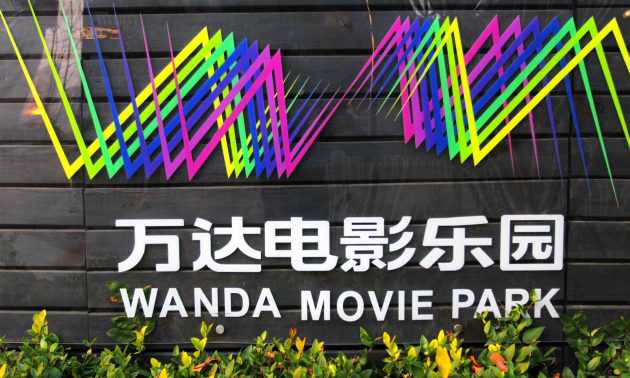Wang seems to have lost his Wanda-lust
28 January, 2018

The Wanda Movie Park was part of property and entertainment group Dalian Wanda. Photo: AFP
The Chinese billionaire tycoon built a massive property and entertainment empire but is now grappling with a debt crisis
Wang Jianlin is not used to being in this position. As the head of the Dalian Wanda Group, he was once the richest man in China with a personal fortune of about US$30 billion, give or take the odd stack of greenbacks.
But now the 63-year-old businessman is grappling with a debt crisis, which has stripped the powerful property and entertainment empire of its former glitzy image.
“Wanda invested in a few projects overseas in the past few years and now we have decided to clear all overseas debt,” he told the group’s annual meeting earlier this week.
Even in his trademark flamboyant tones, he could not hide the pain behind the statement or paper over the cracks which are starting to appear in his sprawling Chinese conglomerate.
Yet in 2016, it was a different story with Wang reading from the movie scripts he loves. Wanda was on the threshold of becoming a world leader in real estate, tourism, entertainment and sports.
“Considering my personality and how the company has executed my plans, I think we will be No. 1 in the world [in those areas],” he told CNN Money.
Wang even had ambitions to buy a major movie studio in the United States. His plan was to snare one of the “Big Six” of 20th Century Fox, Warners, Paramount, Universal, Columbia or even Walt Disney.
It would have expanded Wanda’s presence in the United States after the company acquired the cinema group AMC Entertainment for about $2.6 billion in 2012 and Legendary Entertainment, the studio behind Jurassic World and Interstellar, for $3.5 billion in February 2017.
Looking back, that was the zenith of Wang’s spending spree. By July, his business model was starting to creak after Chinese regulators reportedly told banks to stop providing funding for several of Wanda’s overseas acquisitions.
It was all part of Beijing’s plan to curb what it considered “irrational spending” by major Chinese conglomerates by clamping down on “capital outflows.”
Shortly after, the group sold a portfolio of domestic hotels and tourism assets, including 13 theme parks, for $9 billion to R&F Guangzhou Properties and Sunac China. The news caused more than a few ripples.
“It is a win-win-win for all three parties and will largely reduce Wanda’s debt,” Wang said at the time during a hastily assembled press conference at the Beijing Sofitel Hotel in his flagship Wanda Plaza. “It is also a big step forward in our asset-light transformation.”
But there was disbelief in other quarters of the business community. Part of the deal included what was billed as a “moviemaking metropolis” in the coastal city of Qingdao, according to media reports.
Hollywood celebrities such as Leonardo DiCaprio and Nicole Kidman were there when the $7.3 billion project was unveiled in 2013. It was going to be the centerpiece of Wang’s efforts to make China a film business destination.
Although Wanda will retain a 9% stake in the studio business, the grandiose plans envisaged by the company’s founder appear to be on the cutting room floor.
“Clearly this indicates Wang is lowering his expectations and goals for the entertainment business,” John Burke, head of the entertainment group at legal firm Akin Gump Strauss Hauer & Feld, told the Los Angeles Times.
“People were looking at Wanda like they were the real deal. There’s a lot of tire kickers over here from China, but Wang clearly seemed to be a guy who could write checks and do the deal. Now people are scratching their heads,” he said.
A few are shaking theirs in astonishment. Fitch Ratings estimated that Wanda had total debts of around $34 billion by the end of September 2017.
Short-term problems are also just around the corner for the overseas property division. The company needs to make a $510 million payment on a syndicated loan by the end of March, Bloomberg News reported.
Five high-profile global projects under development in London, Sydney and on Australia’s Gold Coast are in the process of being sold although the group still has substantial interests in Chicago and Beverly Hills.
“Although its [Wanda’s] onshore liquidity position is strong, uncertainty over its ability to transfer money offshore adds to the refinancing pressure,” Kaven Tsang, a credit analyst at Moody’s Investors Service, told Bloomberg News.
A look at the numbers showed that the group’s revenue fell by 10.8% to 227.4 billion yuan ($35.4 billion) in 2017, the second consecutive year it had declined. Net profit remained flat compared to 2016.
“For 2018, we have set a revenue target of 247.9 billion yuan, with around half coming from the commercial real estate arm,” Wang said. “[We] will reduce Wanda’s corporate debt through all available means.
“We should [also] avoid burning big money or playing with concepts and focus on actual results,” he added.
Now, that was not part of the original script.
